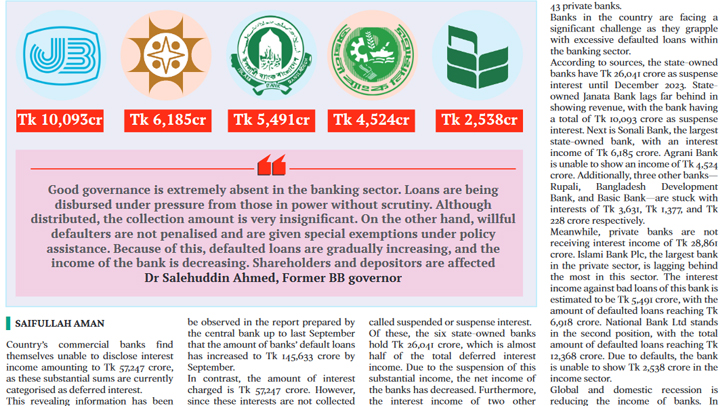
Photo: Messenger
Country’s commercial banks find themselves unable to disclose interest income amounting to Tk 57,247 crore, as these substantial sums are currently categorised as deferred interest.
This revealing information has been obtained from an updated source at Bangladesh Bank (BB).
Based on the information received from the country’s commercial banks, it can be observed in the report prepared by the central bank up to last September that the amount of banks’ default loans has increased to Tk 145,633 crore by September.
In contrast, the amount of interest charged is Tk 57,247 crore. However, since these interests are not collected in cash or the defaulted loans are not renewed, it is not possible to include them in the income sector. Instead, they are transferred to a separate account called suspended or suspense interest.
Of these, the six state-owned banks hold Tk 26,041 crore, which is almost half of the total deferred interest income. Due to the suspension of this substantial income, the net income of the banks has decreased. Furthermore, the interest income of two other specialised government banks has been suspended for Tk 1,914 crore. Interest income of Tk 28,861 crore has been suspended due to defaulted loans from 43 private banks.
Banks in the country are facing a significant challenge as they grapple with excessive defaulted loans within the banking sector.
According to sources, the state-owned banks have Tk 26,041 crore as suspense interest until December 2023. State-owned Janata Bank lags far behind in showing revenue, with the bank having a total of Tk 10,093 crore as suspense interest. Next is Sonali Bank, the largest state-owned bank, with an interest income of Tk 6,185 crore. Agrani Bank is unable to show an income of Tk 4,524 crore. Additionally, three other banks—Rupali, Bangladesh Development Bank, and Basic Bank—are stuck with interests of Tk 3,631, Tk 1,377, and Tk 228 crore respectively.
Meanwhile, private banks are not receiving interest income of Tk 28,861 crore. Islami Bank Plc, the largest bank in the private sector, is lagging behind the most in this sector. The interest income against bad loans of this bank is estimated to be Tk 5,491 crore, with the amount of defaulted loans reaching Tk 6,918 crore. National Bank Ltd stands in the second position, with the total amount of defaulted loans reaching Tk 12,368 crore. Due to defaults, the bank is unable to show Tk 2,538 crore in the income sector.
Global and domestic recession is reducing the income of banks. In this scenario, the profit of the banks is decreasing due to the inability to account for large amounts of interest income due to defaulted loans, which harms the banking sector. This information is known from the BB report.
According to conventional rules, interest collected by banks in cash and interest charged against regular loans may be shown in the income section even if not collected. However, if a loan is defaulted, it cannot be accounted for in the income sector without collecting interest in cash against it. Instead, they have to be deposited separately as deferred interest. Only when those interests are collected in cash can they be taken into income.
Moreover, for defaulted loans that will be renewed, the interest can be included in the income sector. Otherwise, no more interest can be accounted for in the income sector. Currently, due to the increase in defaulted loans in the banking sector, banks are unable to collect large amounts of interest income.
In this regard, former BB governor Dr Salehuddin Ahmed told The Daily Messenger, “Good governance is extremely absent in the banking sector. Loans are being disbursed under pressure from those in power without scrutiny. Although distributed, the collection amount is very insignificant. On the other hand, willful defaulters are not penalised and are given special exemptions under policy assistance. Because of this, defaulted loans are gradually increasing, and the income of the bank is decreasing. Shareholders and depositors are affected. There is no alternative to ensuring good governance to solve these problems. Additionally, the implementation of existing laws is very important.”
Banks are unable to collect these interest charges due to defaulted loans. On the other hand, against these loans, money has to be deposited in the provision sector from the profit earned by the bank. Banks are affected in two ways.
According to prevailing rules, a provision of 5 to 50 percent is required against regular loans. Additionally, a 20 percent provision against bad loans, 50 percent against doubtful loans, and 100 percent against bad loans should be kept.
Banks are supposed to keep a provision of Tk 1,06,375 crores against regular and defaulted loans. However, only a provision of Tk 81,104 crores has been kept. The deficit in this sector amounts to Tk 25,271 crores. The concerned banks have been placed on the list of weak ones due to provision deficiency. This is because, on the one hand, the defaulted loans of those banks are high, and on the other hand, their income is low, resulting in a low transfer of money to the reserve fund. Due to these reasons, they are unable to make provisions with money from profit or reserve funds.
Messenger/Disha








